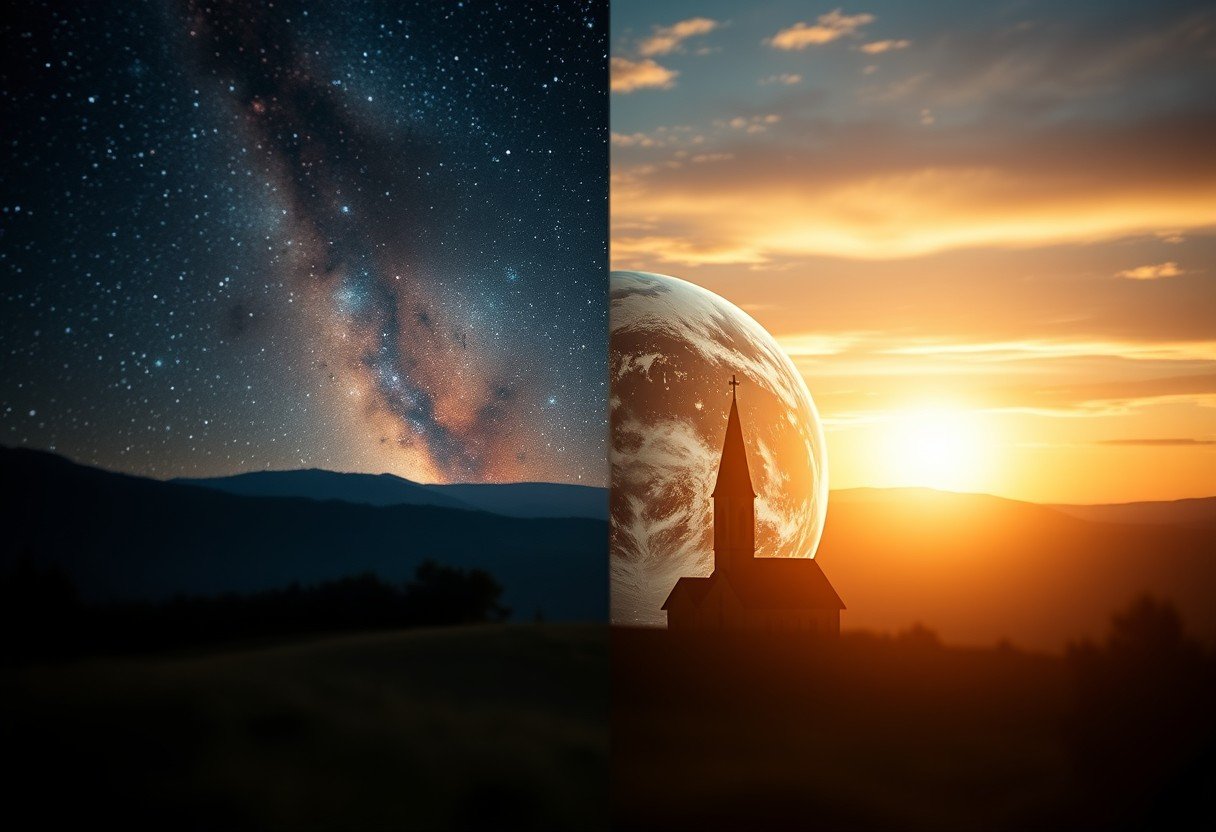How did the universe begin? This is one of humanity’s oldest questions. Atheism and Christianity offer very different answers that shape how we see our world and our place in it. While atheists look to science like the Big Bang theory, Christians believe in a divine creator. Understanding where these two worldviews agree and disagree helps you explore the deep questions about existence, purpose, and reality itself.
The Christian View: A Universe with Divine Purpose
For Christians, the story of the universe begins with God. This belief isn’t just a simple statement but a deep theological foundation that comes from biblical texts, particularly the book of Genesis. It paints a picture of a cosmos brought into existence by a purposeful and all-powerful creator.
This perspective sees God not just as the one who started everything, but as a being who is actively involved in sustaining the universe. The intricate laws of physics, the formation of galaxies, and the existence of life are all seen as reflections of God’s intelligent design and ongoing care.
Christians often view science as a way to understand the “how” of creation, while faith explains the “why.” Many believe that scientific discoveries, like the Big Bang, do not contradict their faith but instead reveal the amazing methods God used to create everything. This intertwines faith with scientific inquiry, seeing the universe’s complexity as proof of God’s grandeur.
The Atheist View: A Cosmos Explained by Science
Atheists approach the origin of the universe from a standpoint of naturalism, which means that everything can be explained by natural laws and processes. This view does not include supernatural beings or divine intervention. Instead, it relies on what can be observed, tested, and proven through the scientific method.
The leading scientific explanation is the Big Bang theory. This theory states that the universe exploded into existence from a single, extremely dense point about 13.8 billion years ago. From that moment, space, time, and matter began to expand and cool, eventually forming the stars, planets, and galaxies we see today.
For an atheist, the universe doesn’t have an inherent purpose; it is the result of natural, unguided processes. This doesn’t take away from the awe and wonder of the cosmos. In fact, it often fuels a deeper curiosity to learn more through scientific discovery, appreciating the universe for what it is without needing a supernatural explanation.
Where Do Atheism and Christianity Find Common Ground?
Despite their vast differences, both atheists and Christians share a powerful sense of wonder about the universe. Both worldviews ask the same fundamental questions: How did we get here? What are the laws that govern reality? What is our place in the cosmos?
This shared quest for knowledge shows a common human desire to understand our origins. Both sides are fascinated by the complexity and scale of the universe, even if they arrive at completely different conclusions about its ultimate cause.
Furthermore, many people from both perspectives can appreciate the importance of reason and evidence. While a Christian’s framework includes faith, many also value scientific evidence. Similarly, atheists are driven by a search for truth based on observable reality. This mutual interest in understanding reality can be a starting point for productive conversations.
The Core Disagreements on the Universe’s Origin
The central point of conflict is the role of a creator. Christians believe in a God who intentionally designed and created the universe, while atheists argue that natural processes are sufficient to explain its existence. This fundamental difference leads to several other key disagreements.
One major area of dispute is the interpretation of evidence. Atheists place their trust entirely in empirical data and scientific theories that can be tested. For Christians, faith and spiritual experiences are also valid forms of evidence, providing insights that science cannot.
Here is a simple breakdown of the main points of disagreement:
| Aspect | Atheist Perspective | Christian Perspective |
|---|---|---|
| Primary Cause | Natural processes (Big Bang) | Divine creation by God |
| Guiding Force | Physical laws and random chance | God’s intentional will and purpose |
| Source of Evidence | Empirical data and scientific method | Scripture, faith, and science |
| Inherent Purpose | None; meaning is created by humans | Yes; universe was created for a reason |
How Beliefs About Origins Shape Morality and Meaning
Your view on the universe’s origin has profound effects on how you see your own life, including your sense of morality and purpose.
Christians typically derive their moral framework from their belief in God. Divine commandments, like those found in the Bible, provide a clear guide for right and wrong. Meaning in life is often found in having a personal relationship with God and living according to His divine plan. This gives existence an eternal significance.
Atheists, on the other hand, build their ethical systems without divine guidance. Many turn to secular humanism, which bases morality on reason, empathy, and a concern for human well-being. From this perspective:
- Meaning is not given, but created.
- Purpose is found in human relationships, personal achievements, and contributing to a better society.
- Life has value because it is finite, making our experiences and actions more precious.
This shows that both worldviews offer a robust framework for living a meaningful and ethical life, though they start from completely different assumptions about reality.
Fostering Dialogue Between Different Worldviews
The conversation between atheism and Christianity about the universe’s origin doesn’t have to be a battle. When conducted with respect, it can be an opportunity for mutual growth and understanding. Both sides are trying to make sense of the same reality, just using different tools and frameworks.
For a productive dialogue to happen, both atheists and Christians must listen to each other with an open mind. Acknowledging the other person’s perspective, even if you strongly disagree with it, is crucial. This approach can help bridge gaps and find shared values, such as the pursuit of truth and a shared wonder for the cosmos.
In our diverse world, learning to discuss these deep topics respectfully is more important than ever. It enriches our own understanding and promotes a more tolerant society.
Frequently Asked Questions about Atheism, Christianity, and the Universe
What is the main difference between how atheists and Christians view the universe’s origin?
The primary difference is the presence of a creator. Christians believe God intentionally created the universe with a purpose, while atheists believe the universe began through natural, unguided processes like the Big Bang.
Do all Christians reject the Big Bang theory?
No, many Christians accept the Big Bang theory. They often view it as the scientific explanation for the method God used to create the universe, seeing science and faith as complementary rather than contradictory.
How do atheists find purpose in a universe without a creator?
Atheists typically find purpose through human relationships, personal growth, contributing to society, and appreciating the beauty of the natural world. They believe that meaning is something humans create for themselves, not something given by a divine being.
Is there any common ground between atheism and Christianity on this topic?
Yes, both worldviews share a deep curiosity and wonder about the universe. They both ask profound questions about existence and reality and seek to understand the cosmos, even though they use different methods to find answers.
How does the Christian view explain the laws of nature?
In Christian theology, the laws of nature (like gravity and physics) are often seen as a reflection of God’s faithful and orderly character. They are the consistent rules God established to govern the universe He created and sustains.








Leave a Comment